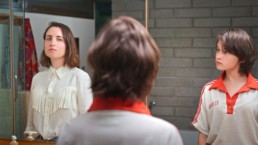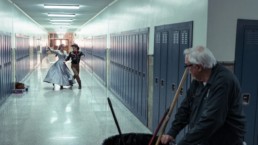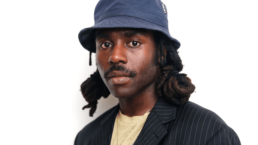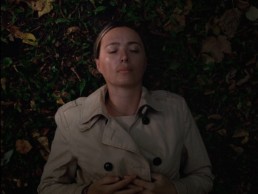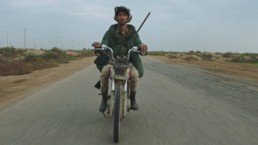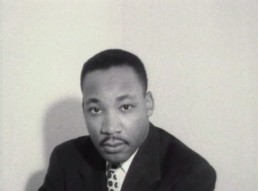'How It Ends' Sundance Review: An Oddball Apocalyptic Comedy
If you're like me, there was probably a point last year when you thought the world was going to end. Whether it was the confirmation that aliens and murder hornets exist or baking so much bread that you overdose on carbs, existential crises were a dime a dozen. The crazier the news got, the more it got me thinking: given the opportunity to plan my last day on Earth, what would I want to do? How It Ends is a charming, pre-apocalyptic film made at the height of the COVID-19 pandemic in Los Angeles (because that's how creatives deal with "end of the world" anxiety: they make things). This strange but oddly cathartic comedy is the brainchild of the married writing/directing duo Zoe Lister-Jones and Daryl Wein, who allow us to find the dark humor in this truly unprecedented moment in time.
Set primarily in Silver Lake (but jaunts around the Eastside), Eliza (Zoe-Lister Jones) and her metaphysical younger self (Cailee Spaeny) prepare to live out their last day on Earth. First stop, the weed dispensary. All Eliza wants to do is get high, eat until she pukes, and then die, but her younger self won't allow her to "go out" that way. She encourages Eliza to attend one last party but first, she must tie up loose ends with her ex-boyfriends (Lamorne Morris, Paul W. Downs), absentee parents (Helen Hunt, Bradley Whitford), and of course, her frienemy (Olivia Wilde). With the game plan set, Eliza and her younger self embark on an existential, soulful scavenger hunt for closure.
Given that filming restrictions were at an all-time high during production, How It Ends gives off an eerie minimalist presence. For the most part, there are no more than three people in a single shot, and the 6 feet distance rule is in full effect. In these conditions, it would have been easy to make something sterile. But How It Ends is the furthest thing from sterile, in large part due to one of the best ensemble casts of recent memory. Short but sweet scenes with a kooky Fred Armisen, a tripping Charlie Day and Mary Elizabeth Ellis, a singing Glenn Howerton, and the incredible Sharon Van Etten all give the film bursts of energy. Every actor's unique contribution to an already stellar script fills up the film's comedic heart.
You know how you can tell when someone is about to smile, but they try to hide it? That's the entire vibe of this film. Lister-Jones and Wein were able to assemble a stellar cast of actors, all of whom were psyched to be working after the film industry shut down. Even if their screentime was brief, like Nick Kroll or Ayo Edebiri, their genuine happiness to be back on a film set reverberates from the screen, making this lighthearted watch about a truly horrifying situation all the more bearable.
How It Ends is comedic relief that doubles as a cathartic time capsule for this zany moment in history. For all the panic we've gone through over the past year, let this film be a sigh of relief that there are brighter days ahead. It may be the end of the world as we know it, but I feel fine.
Watch This Ethereal Piano Rendition From 'I'm Thinking of Ending Things'
Charlie Kaufman's psychological drama I'm Thinking of Ending Things is full of surprises and bold choices. One of the more ambiguous and widely talked about moments comes in the form of a performance from the musical "Oklahoma!," which has sparked many "What does it all mean?" theories and YouTube video essays. But there's another musical moment that gets right to the heart of the film–the desire and longing for human connection–and that's the ethereal ballet sequence.
Cinemacy is excited to premiere the piano rendition of “Dream Ballet” from the original score of I’m Thinking of Ending Things by composer Jay Wadley and pianist Timo Andres. Timo effortlessly performs this 4 hand piano version with such mesmerizing grace and precision. In addition to the lovely musical interpretation, the short film's double exposure of Timo playing both piano parts also acts as a visual nod to the unique, Kaufman-esque style of filmmaking.
Check out the video below:
https://www.youtube.com/watch?v=BuE-Si02ChU&feature=youtu.be
Says Jay, “After finishing [I’m Thinking of Ending Things], I was very excited to find an opportunity to create a two-piano version of the ballet in the tradition of transcriptions of the ballets of Stravinsky, Tchaikovsky, and many others. It’s always a funny thing hearing a composition you wrote for one instrumentation or medium translated to another. This piece really evolves and takes on a new life of its own, developing into something entirely fresh while reflecting concepts and themes of the film both visually and, of course, musically.”
After watching Timo's stripped-down version, check out Jay's original orchestral version of “Dream Ballet” below.
You can watch I'm Thinking of Ending Things in concert at the Film Music House, presented by White Bear PR, at the virtual Sundance Film Festival.
The Standout Composers of Sundance 2021
One of the first things I look for when planning out my Sundance selects are the composers of Sundance, who contributed to the music, and who is the music supervisor.
I've worked in music supervision full-time for over six years, and I've grown accustomed to seeking out my colleagues' names first. Just like directors can have a distinct "style," so can composers. After falling in love with the score from The Last Black Man in San Francisco at the 2019 Sundance Film Festival, I now seek out any project that composer Emile Mosseri is attached to, knowing that it will most likely be a film I'm interested in (a theory that has proven true so far, see: Minari, Kajillionaire).
To me, the sound of a film is just as important as the person directing it or the actors involved. After scouring the Sundance slate, here are some of the musical standouts from this year's festival and, going forward, I'd love to see more women in this space.
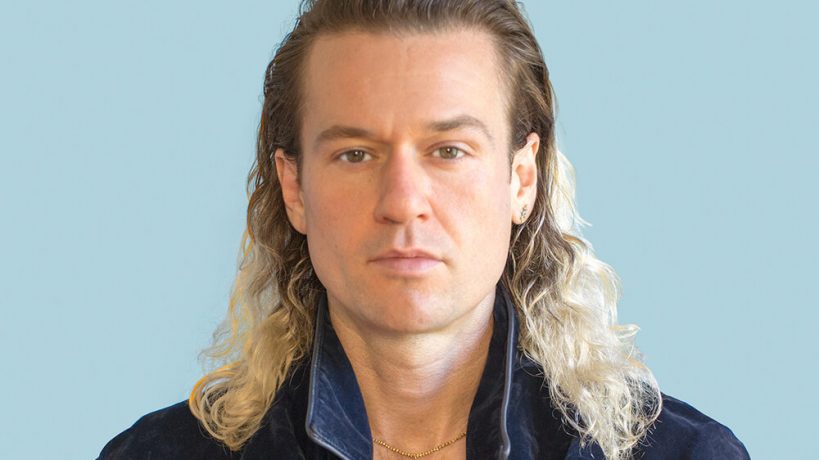
John Carroll Kirby (Cryptozoo)
John Carroll Kirby's album My Garden singlehandedly got me through quarantine last year. He's a pianist, producer, and composer from Los Angeles who creates beautifully meditative tracks, as well as being the go-to collaborator for Solange and Frank Ocean, among others.
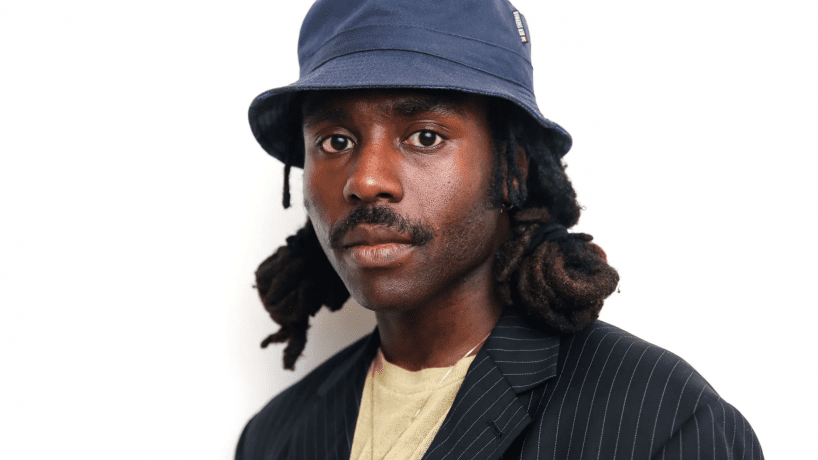
Devonté Hynes (Passing)
You might know him better as his moniker Blood Orange. Dev, described as a "polymath musician" by the New York Times, is one of the most dynamic and interesting artists working today, blending the gritty and melancholy to create a sound unique to him.
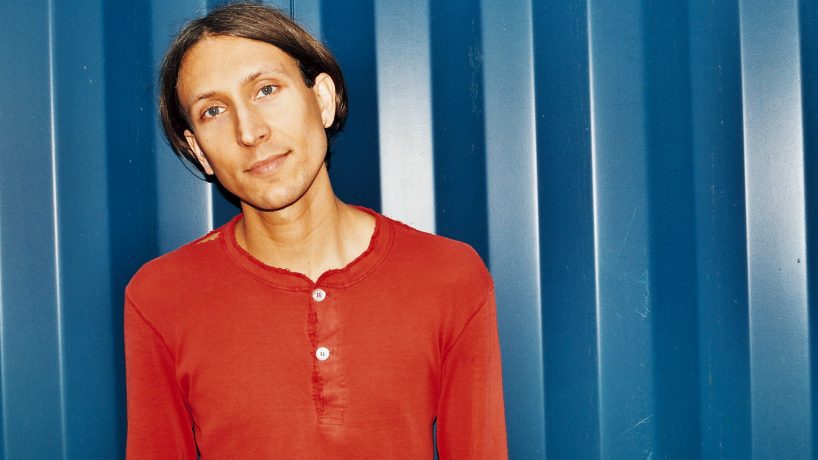
Alex Somers (Together, Together)
Having composed the playfully introspective soundtrack to one of my favorite films last year, Honey Boy, Alex Somers returns to Sundance with what I can only imagine will be another heartfelt and transcending score.
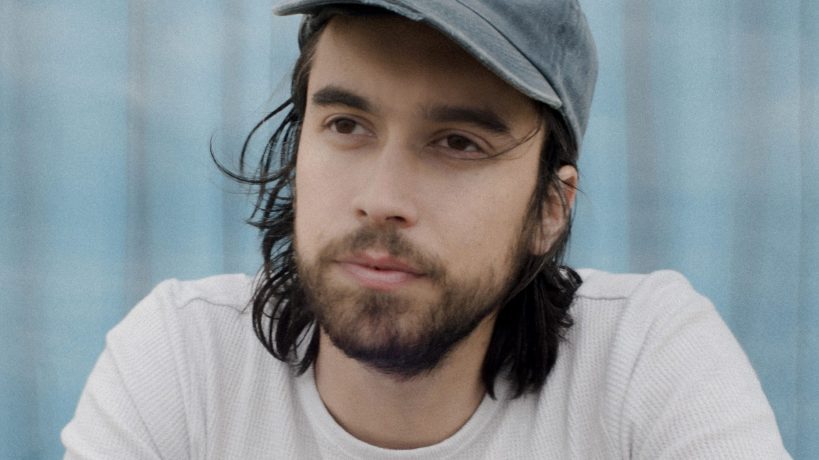
Alex G (We're All Going to the World's Fair)
A self-described singer-songwriter, dreamer, visionary, and leader, (Sandy) Alex G creates indie bedroom pop that feels like a modern-day Elliott Smith. Ryan and I are both excited to see what he does in a cinematic setting.
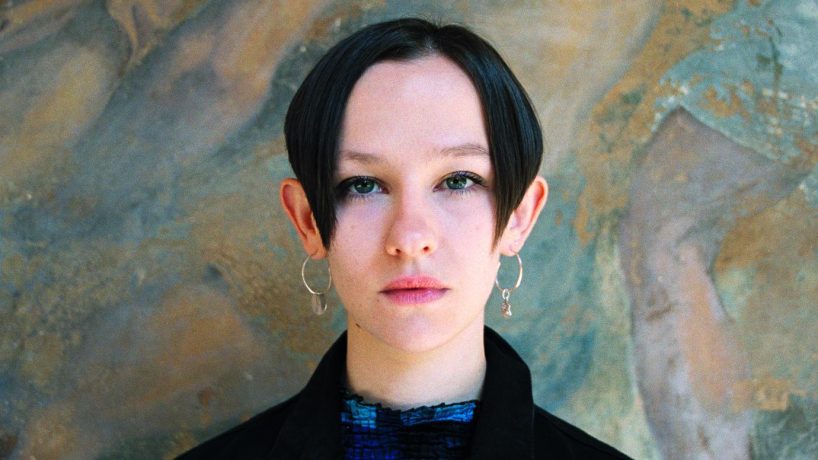
Caterina Barbieri (John and the Hole)
Caterina is an Italian composer and musician who explores themes related to machine intelligence. Pitchfork describes her synth-heavy sound like music that bends time and space.
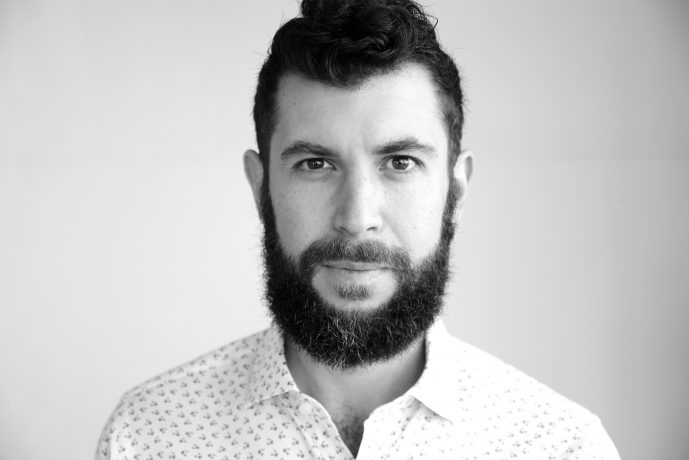
Mike Tuccillo (Homeroom)
Probably best known for scoring the Hulu/A24 series Ramy, Mike is also a producer and mixer. Tuccillo has mixed and contributed additional production to the majority of VÉRITÉ’s records which have more than 100 million plays on Spotify.
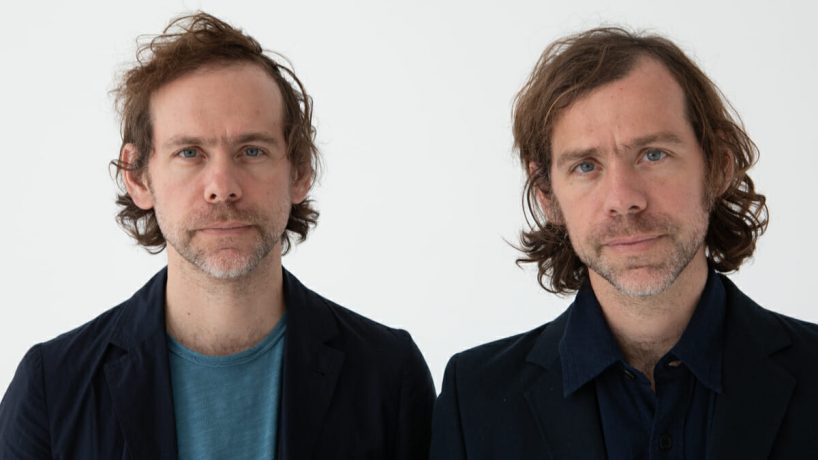
Aaron Dessner & Bryce Dessner (Jockey)
The Dessner twins may be better known as half of The National but did you know that they, along with my absolute favorite Justin Vernon (of Bon Iver), helped launch the 37d03d (PEOPLE) collective in 2016? 37d03d produces multi-artist events and operates an independent record label, all with the goal of supporting and encouraging spontaneous collaboration.
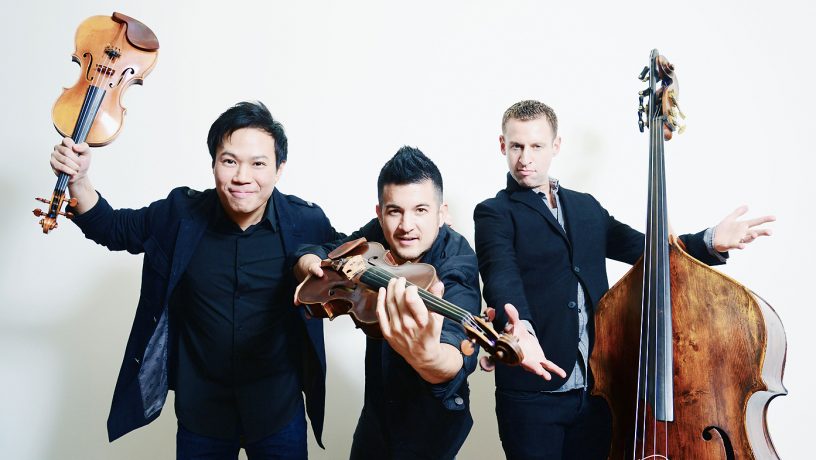
Time for Three (Land)
Guests of NPR's Tiny Desk, Time For Three is an unconventional trio that blends Americana, modern pop, and classical music genres to create a sound all their own.
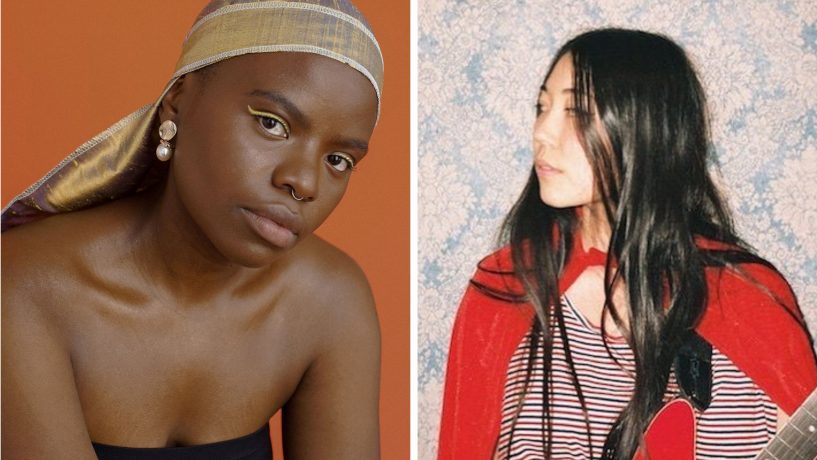
Vagabon, SASAMI (Weirdo Night)
Not composers, per se, but I couldn't not talk about the performers in Weirdo Night, the brainchild of performance artist Jibz Cameron aka Dynasty Handbag. What used to be a monthly stage show at Zebulon in Los Angeles (that I miss so much), this homage to Weirdo Night includes performances from SASAMI, Vagabon, and more.
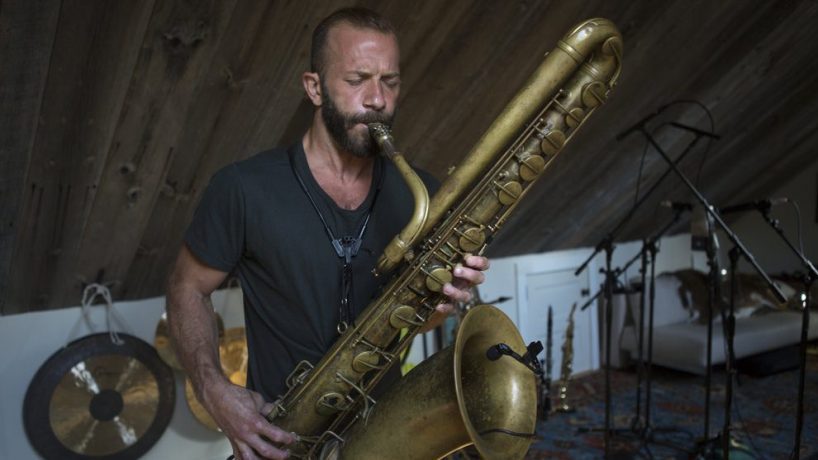
Colin Stetson (Mayday)
Probably best known for his haunting score in Hereditary, Colin's bass and alto saxophones produce emotionally rich and polyphonic compositions that transcend expectations of what solo horn playing can sound like.
PLUS:
Highlights from past years have been seeing Dark Rooms, Ethan Gruska, Brett Dennen, and more at the ASCAP Music Café, an intimate performance space that also serves as our recharging station in between screenings. Experiencing artists' showcases in this setting has always been one of my favorite parts of the festival experience, and as I (and the rest of the world) patiently wait for live music's highly anticipated return, a virtual venue promises to recreate this unique ASCAP lounge.
This article was updated 1/28/2021
'Beginning' Review: Georgian Arthouse Film is a Provocative Experience
You can be religious yet still be soulless, as evidenced in director Dea Kulumbegashvili's slow-burning drama, Beginning. Executive produced by Carlos Reygadas (Our Time), Beginning takes patience and a steady eye to fully get wrapped up in its intricate character complexities, but those willing to immerse themselves in the unsettling are in for a provocative cinematic experience.
Set in a remote village outside of Tbilisi, Georgia, a sect of Jehovah’s Witness missionaries come under attack when arsonists burn down the community's church, leading David (Rati Oneli) and his wife Yana (Ia Sukhitashvili) to reevaluate their roles as leaders in the organization. Going to the police proves uneventful, as the authority's ambivalence towards the group only makes the situation more devastating. With David pre-occupied rebuilding the church, Yana becomes the target for a local detective (Kakha Kintsurashvili) who abuses his power in various sexual and physical ways. It breaks her spirit, leaving Yana questioning her role as a wife, mother, and spiritual believer.
Beginning will be remembered for its 35mm scenes comprised heavily of single-take shots lasting minutes long...
In her debut feature film, Dea Kulumbegashvili commands the screen with confidence. Beginning will be remembered for its 35mm scenes comprised heavily of single-take shots lasting minutes long, a convention that lags at times, but ultimately gives the film a sense of authenticity. Ia Sukhitashvili's performance as a woman at odds with herself is revelatory, in which her pain is seen and felt even without uttering a single word.
Beginning is a true art film; its untraditional structure of mostly one-take scenes won't be for everyone, but if you can carve out the two hours and ten minutes of watch time, the payoff is worth it. Plus, if Beginning gets a nomination for the Best International Feature, it will make history as the first Georgian Oscar nominee.
'Beginning' is available to watch on MUBI this Friday, January 29, 2021.
'Notturno' Review: What's Left When The War Stops?
Academy Award-nominated director Gianfranco Rosi (Fire at Sea) delivers another richly cinematic documentary with Notturno, and this time we’re transported to the heart of the Middle East where communities are still reeling from past and future wartime chaos.
Rosi and his crew shot Notturno–Italy's official Oscar entry for Best International Feature–over the last three years along the borders of Iraq, Kurdistan, Syria, and Lebanon. The beauty in the mundane, the heartache of reality, and the perseverance in the face of an unknown future are at the heart of this film, which lends itself to be a heavy, but highly-rewarding, watch.
The opening shot shows small groups of men running laps around a track at what looks like dawn. The image is jaw-dropping, beautiful in its simple composure. It feels eerily reminiscent of Claire Denis’s Beau Travail or Andrey Zvyagintsev’s Leviathan where the camera is steady and the subjects that run in and out of frame provide the spontaneous artistic direction. The rest of the film follows suit, where long takes create drawn-out scenes that give the audience the sense of being there too.
... [It] makes me want to reach through the TV screen and give them all a big, tight hug.
In one of the more devastating scenes, we observe a child therapist asking different children to express, through drawings, their various experiences under ISIS control. Listening to these innocent children describe beheadings, watching people get burned alive, and sharing that they still cry when they think about those moments makes me want to reach through the TV screen and give them all a big, tight hug.
Notturno gives a face and a voice to the human struggle in the Middle East. For as much as we might want to look away and not face the sick reality of violence and hardship, it is our duty as brothers and sisters of the world, and fellow humans, to acknowledge these tragedies. Watching this film and becoming aware of their daily struggles is a great first step.
Distributed by The Match Factory, available in select virtual theaters this Friday, January 22, 2021, and on Hulu January 29, 2021.
'MLK/FBI' Review: The Extreme Measures Taken to Silence a Hero
With all of the political unrest and never-ending news cycles populating our feeds and our minds as of late, another "charged" documentary may not sound like the type of film you'd want to spend your free time watching. I can relate to the feeling of utter exhaustion, but I hope you'll make MLK/FBI an exception. Sam Pollard's revelatory documentary exposes not just the private emotional hardships suffered by Dr. Martin Luther King, Jr. at the hands of then-FBI director J. Edgar Hoover, it stands as an eerie mirror to our current state of political manipulation and ongoing bias and violence toward the BIPOC community.
We all know Dr. Martin Luther King, Jr.'s life-changing contribution to American society through his March on Washington, the "I Have a Dream" speech and other inspirational, peaceful demonstrations that led to the desegregation of black people. What caught me by surprise was the FBI's many attempts to discredit his leadership by surveilling him with wiretaps, undercover photos, and bugging his family home. These findings from the early 60s have now been uncovered and are the basis of MLK/FBI.
Dr. King's rising success scared Hoover, the documentary claims, as a now-declassified memo sent around the FBI headquarters stated, "We must mark [Dr. King] now as the most dangerous Negro in the future of this Nation..." Hoover also thought Dr. King was "morally unfit" to be a leader for Black America, a hilariously ironic and completely ridiculous statement given the obvious example of what an actual morally unfit leader looks like.
Hoover also thought Dr. King was "morally unfit" to be a leader for Black America, a hilariously ironic and completely ridiculous statement given the obvious example of what an actual morally unfit leader looks like.
Educators and historians provide voiceovers that carry MLK/FBI and unanimously agree this was the "darkest part of bureau's history." The film is comprised of archival footage showing how they surveilled him, in addition to footage of political events, KKK rallies, interviews with Dr. King, and more. But for as shocking as this story is, at times, the film feels repetitive in its visuals. Perhaps seeing the narrators' faces throughout would provide a better human connection instead of watching scenes from a Buster Keaton or scripted Universal Pictures FBI film multiple times.
America has an ugly past; we can't ignore that. The only way to truly make progress towards a more inclusive future is to acknowledge past inequalities and make substantial changes so the attitudes and behaviors of the past don't bleed into the future. Dr. Martin Luther King, Jr. is remembered for many things, but right now, it's so important to revisit his message of fighting back with love, as "violence will not succeed in changing this nation."
Distributed by IFC Films, opening in select theaters, including the Arena Cinelounge Drive-In in Hollywood, and on-demand January 15, 2021 (MLK Weekend).
Nainita Desai Premieres Music Video from 'The Reason I Jump'
After last year's successful Sundance premiere, the award-winning documentary The Reason I Jump has finally made its way into virtual theaters. Directed by Jerry Rothwell and based on the book written by the young autistic artist Naoki Higashida when he was 13-years-old, The Reason I Jump celebrates the beauty of being different. Composer Nainita Desai further illustrates this sentiment in her companion music video "Beauty Is In The Detail," exclusively premiering on Cinemacy.
The central theme of the film is communication and all of its interpretative forms. With this in mind, Nainita's biggest challenge was illustrating and amplifying what it feels like to be autistic. Nainita successfully communicates intense sensory worlds into song by using orchestral strings, custom-made instruments, electronics, and found sound.
"The song represents the beauty of the neuro-diverse world and how the characters perceive the detail in objects before seeing the whole picture unfold before them," says Nainita. Plus, to keep the soundtrack inclusive and authentic to the film, Nainita reached out to Elisabeth Wiklander, a cellist with the London Philharmonic Orchestra who is autistic as well as a cultural ambassador for the National Autistic Society. Daniel Pioro (Phantom Thread) is the featured violinist on the track.
Nainita's contribution to the film continues to gain accolades from industry professionals. Most recently, she was recognized by the British Independent Film Awards and Cinema Eye Honors with best score nominations.
The soundtrack to The Reason I Jump will be released by the London-based label Mercury KX on April 16, 2021.
'Acasa, My Home' Review: Trying to Domesticate a Free Spirit
Set in a barely-livable compound in the middle of the untamed Bucharest Delta lives the Enache family. The nine children and their parents have called the decrepit shack and the surrounding wildlife their home for 18 years, a miraculous feat considering the circumstances and extreme weather conditions they face every season in Romania. Their incredible story of adaptation is told by first-time filmmaker Radu Ciorniciuc in the cinematically striking documentary Acasa, My Home.
If you liked 2019's Honeyland, and 2015's The Wolfpack, then you'll be blown away by the thematic similarities in this film. Winner of the Special Jury Award for Cinematography at the 2020 Sundance Film Festival, Acasa, My Home is a searing portrait of humans' symbiotic living with nature, and the devastating effect of trying to domesticate a free spirit.
While it is certainly not ideal conditions to raise a family in, the elder Enache–a strong-headed, stubborn drunk who doesn't listen to authority–chooses this life for himself and his family. He ignores pleas from social services and refuses government intervention until he cannot turn a blind eye any longer. A highly anticipated urban nature park, in which Prince Charles was the guest of honor at the groundbreaking ceremony, is set to start construction on the land, forcing the Enaches to adapt to urban living in city-sanctioned housing.
For all of the children (some teenagers), this is their first time attending school, making friends outside of their siblings, and learning how to spell their own names.
Acasa, My Home feels distinctly split into two acts; Act 1 consists of the family's daily struggle to survive in the Romanian wilderness, and Act 2 shows their attempt at acclimating into society. For all of the children (some teenagers), this is their first time attending school, making friends outside of their siblings, and learning how to spell their own names. Pressure builds within the family, and their selfishness, ignorance, and defiance further splinter already delicate relationships.
Visually, Acasa is stunning. Incredible drone shots capture the vast freedom that the Enache's had for 18 years, while more observational close-ups show the intimate dynamics between siblings and parents. Their move to the city feels obviously more constrained, both emotionally and physically. Paired with bold and investigative direction from Radu Ciorniciuc, Acasa, My Home is a sweeping, powerful watch.
One moment I haven't been able to forget is the scene where a park ranger educates spectators on the newly constructed nature park. In talking about its native plants and animals, he reminds the group to not disturb the wildlife. People used to try to catch the wild birds and domesticate them, but they would die because they're not meant for captivity. Their home is in nature, we cannot force a wild creature to adapt to our definition of "acceptable living." Even if it's an allegorical story, it's fittingly applied here.
Distributed by Zeitgeist Films, in association with Kino Lorber, the film is available to stream via Kino Lorber virtual marquee on Friday, January 15, 2021.

